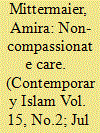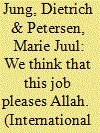| Srl | Item |
| 1 |
ID:
179998


|
|
|
|
|
| Summary/Abstract |
Drawing on fieldwork at a large charity organization in Cairo, this article describes a bureaucratized Islamic ethics of care. Founded in 1975, the Mustafa Mahmoud Association today offers free and discounted medical services, funds micro-projects, and provides financial support to about 10,000 families each year. The bulk of that financial support comes from donors’ private donations in the form of obligatory and voluntary alms (zakāt and sadaqa). By taking a close look at three offices—the donation, intake, and disbursement office—I untangle the regime of care that shapes the daily transactions at this Islamic charity organization. In particular I highlight a significant gap between “caring for” and “caring about.” Donors view caring for those in need as a duty and frequently frame their donations in calculative terms, as a way of “trading with God.” Less central is a language of empathy or compassion. While this seemingly careless care-less? Careless means not careful, sloppy. form of caremight seem cold and heartless, I suggest that it offers a powerful alternative to the liberal illusion of “compassion.”
|
|
|
|
|
|
|
|
|
|
|
|
|
|
|
|
| 2 |
ID:
158570


|
|
|
|
|
| Summary/Abstract |
Islamic almsgiving is on the rise among Muslims in India, as charitable donations by individuals come to supplant landed endowments as the lifeblood of many Islamic associations. Techniques of mass fundraising in India by Islamic revivalist movements such as Deoband facilitated their expansion across the subcontinent. Such fundraising depended on documentary practices such as verification letters, lists of donors, and receipts for donations. This article illustrates how charity receipts and other documents that change hands in ritual Islamic almsgiving are also a key part of new Indian Muslim collective identities. Moral ties as well as money circulate in this Islamic charity economy. Financial documents are Islamic philanthropy's answer to ‘print capitalism’, serving as material rituals of symbolic community across vast distances. Moreover, the use of documents in traditional Islamic almsgiving is also inflecting pious Muslims’ spiritualities. Islamic charity receipts in particular are contributing to the individualization of religiosity among Lucknow Muslims. New modes of accounting (originally intended to ensure financial compliance) also allow Muslim almsgivers to ‘account’ for accrued piety in a perceived spiritual merit economy.
|
|
|
|
|
|
|
|
|
|
|
|
|
|
|
|
| 3 |
ID:
131562


|
|
|
|
|
| Publication |
2014.
|
| Summary/Abstract |
This article explores the role of Islam in contemporary Jordanian charities and social welfare organizations. In what ways do these organizations relate to Islamic traditions in their work? What role do religious convictions play in the construction of modern selfhoods among their employees and volunteers? Do these constructions relate to broader, globally relevant, social imaginaries? The article tries to answer these questions by applying a novel analytical framework to qualitative data from fieldwork conducted among Jordanian charities and social welfare organizations. We treat these organizations as "social sites" for the reinterpretation of Islamic traditions in the context of global modernity as well as for the construction of meaningful forms of modern selfhoods among their members. In doing so, we argue that these specifically Islamic identity constructions can fruitfully be understood with reference to different types of globally relevant social imaginaries.
|
|
|
|
|
|
|
|
|
|
|
|
|
|
|
|